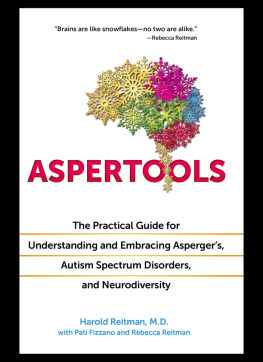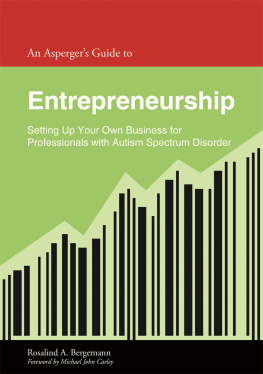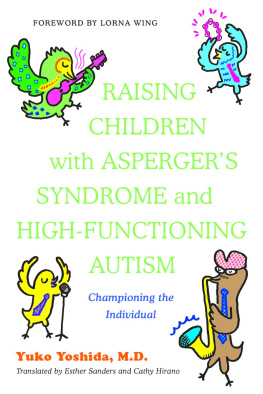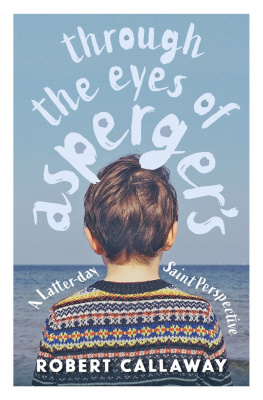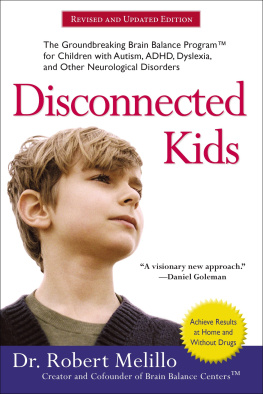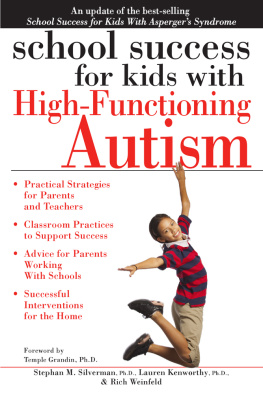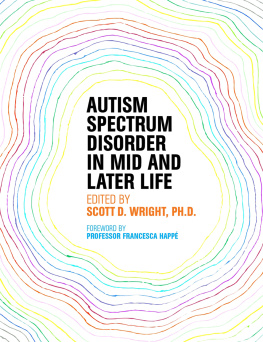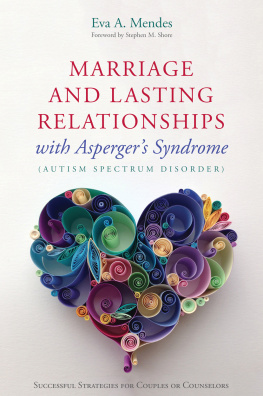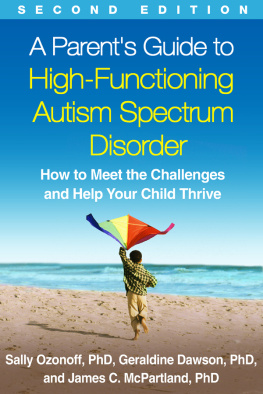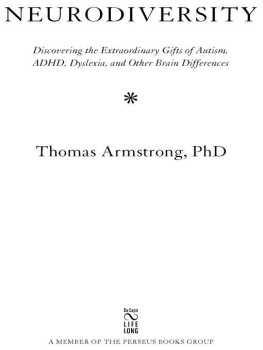Praise for
Aspertools...
I strongly recommend Dr. Reitmans book Aspertools to people who are interested in understanding that each child is entitled to learn and develop in a way that enables that child to succeed....
Abraham Fischler
President Emeritus, Nova Southeastern University
I believe that Aspertools by Dr. Hackie Reitman is at the vanguard of changing peoples perceptions about whats going on with our brains.
Brian Udell, M.D.
Medical Director, The Child Development Center of America
Aspertools will help in so many ways. Without realizing it, Dr. Hackie Reitman has written a great book about all relationships and parenting.
Dr. Lori J. Butts, J.D., Ph.D.
President, Florida Psychological Association, 2015,
Director of the Clinical and Forensic Institute
Aspertools brings hope and optimism to Aspies and their families! After so many books filled with diagnostic tools and statistical data, finally , here is a book about Aspergers syndrome that actually offers something helpful: how to cope with the various symptoms and overcome the challenges. The insight and practical advice from the multiple points of viewthe Aspie, the parent, and the educatorprovide a comprehensive yet easily readable work. Thank you, Dr. Reitman, for reaffirming that Aspies can and do lead productive, fulfilling lives!
Delfina B.
Aspie mom
What an awesome story of impact and vision! On behalf of the KID in all of us, thanks.
Mark D. Dhooge
President/CEO, Kids In Distress, Inc.
As a professor of philosophy, I have taken some instruction from Aspertools . Dr. Reitman has given me a more profound grasp of the fact that one size does not fit all when it comes to learning, and that what one student can handle with aplomb might cause another to grind his teeth with anxiety.
Gordon Marino
Professor of Philosophy at St. Olaf College,
editor of The Quotable Kierkegaard, and
writer, The New York Times and The Wall St. Journal
When I read Aspertools , I thought, My gosh, Dr. Reitman is writing about my two teenagers! This book has opened my eyes.
Dawn D.
mother, medical technician
Aspertools is a big help. I think too many people dont know enough about Aspergers, the autism spectrum, and different brains in general.... I think Dr. Hackie Reitman himself wishes he wouldve known these tools when his daughter was growing up.
Dr. Susan J. Mendelsohn
clinical psychologist and life coach
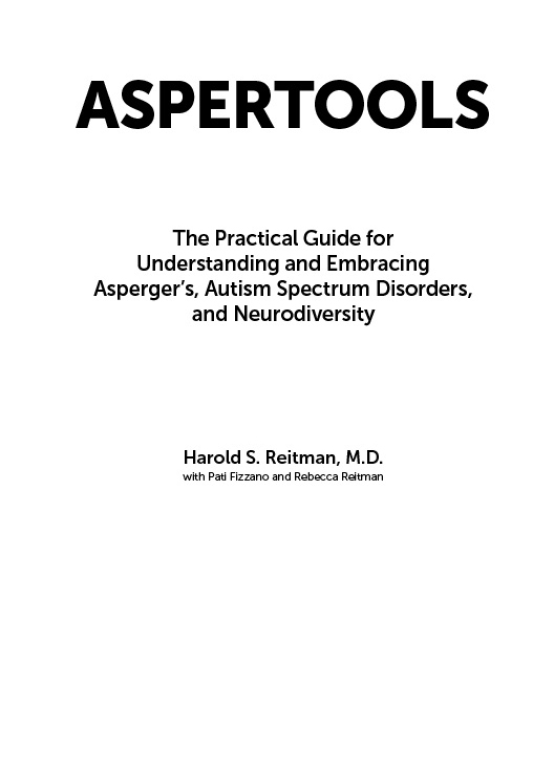

Health Communications, Inc.
Deerfield Beach, Florida
www.hcibooks.com
Library of Congress Cataloging-in-Publication Data
is available through the Library of Congress
2014 Harold S. Reitman, M.D.
ISBN-13: 978-07573-1853-5 (Paperback)
ISBN-10: 07573-1853-3 (Paperback)
ISBN-13: 978-07573-1854-2 (ePub)
ISBN-10: 07573-1854-1 (ePub)
All rights reserved. Printed in the United States of America. No part of this publication may be reproduced, stored in a retrieval system, or transmitted in any form or by any means, electronic, mechanical, photocopying, recording, or otherwise, without the written permission of the publisher.
HCI, its logos, and marks are trademarks of Health Communications, Inc.
Publisher: Health Communications, Inc.
3201 S.W. 15th Street
Deerfield Beach, FL 334428190
Cover design by Larissa Hise Henoch
Interior design and formatting by Lawna Patterson Oldfield
ePub created by Dawn Von Strolley Grove

CONTENTS
Foreword
Acknowledgments
Preface: Everyones Brain Is Different
Introduction: Who Am I Calling an Aspie?
1Anxiety
2Hypersenses: Senses on Steroids
3Observation: Elementary, My Dear Watson
4The Meltdown
5The Safe Place
6Rudeness, Truth Telling, and Manners
7Transitions
8Routines
9Structure and Positive Activities
10Obsessions and Hyper-Interests
11Social Awkwardness
12Limit Choices to Avoid No!
13Instilling Street Smarts
14Taking Things Literally: Why Did They Say Im Not Playing with a Full Deck?
15Specifics: Say What You Mean, Mean What You Say
16Preventing Overwhelm: Breaking Down Big Jobs into Smaller Tasks
17Setting Goals
18Rules, Rewards, and Consequences
19Checklists: The Indispensable Tool
20Time Management: Tools for Getting Your Aspie to Be on Time
21Overlapping Conditions
22Its Not About You
23Love Unconditionally
Afterword: Neurodiversity
Appendix A: A List of Aspertools
Appendix B: Advocacy
Appendix C: Resources

Foreword
Dr. Harold Hackie Reitmans Aspertools is a book that throws the book at stereotypes. However, before we get to the specifics, permit me to note that the author himself is someone who defies stereotypes. After all, Dr. Reitman is a former professional boxer who boasted a heavyweight right hand. He was also a renowned orthopedic surgeon, who used the same hands that produced hurt to remove it by repairing torn ligaments and bones. Again, he is not your stereotypical doctor or boxer, or, for that matter, author.
I first encountered Dr. Reitman in the corridors of boxing. I was writing a story about the legendary boxing trainer Angelo Dundee. Over time, I was blessed to develop a friendship with Angelo, and in our almost daily phone conversations he kept pestering me, You have to meet my friend Hackie Reitman. You two would be great pals.
One does not become a Hall of Fame boxing trainer without being something of a master psychologist. Angelo was right; Hackie and I hit it off right away, in part because he is such a warm, compassionate, and open individual, which, by the way, are qualities that resonate throughout the pages youre about to turn.
In our first conversations, one of the issues that Hackie shared was his ongoing education about Aspergers. This was an education that he received slowly and often painfully as he came to understand that his daughter Rebecca was an Aspie.
The good doctor struggled mightily to understand the landscape of Rebeccas mind and feelings. At one point, after Rebecca graduated from college, her father tried to push her along the career path of becoming a teacher. Resisting, Rebecca instructed him, Everyones brain is different. Brains are like snowflakesno two are alike.
While it might seem like a contradiction, since this is a book of practical advice for people dealing with a distinct set of challenging thought and behavior patterns, Rebeccas observation that No two brains are exactly alike is perhaps the fulcrum of this book. The philosophical point (and there are many between these covers) is that with all the lush diversity of humankind, we have to be alive to the fact that some people experience the same thing in radically different ways.
For instance, in the first chapter Anxiety, Hackie confides that there were times when he reacted angrily to Rebeccas reluctance to enter into seemingly social situations that he saw as only positive. He thought she was simply being stubborn. But then he came to understand that some people do not have a ready store of knowledge as to how to read and react to others. More likely than not, many of these same folks are also hypersensitive to ordinary stimuli such as light and noise.
Next page
